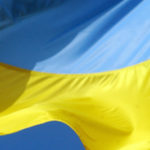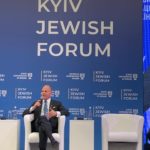
Council of Europe
During the final days of January, Ukrainian President Volodymyr Zelensky carried out two sensitive “working visits,” to Israel and Poland. They were connected with the 75th anniversary of the liberation of the Auschwitz-Birkenau concentration camp located in Poland and International Holocaust Remembrance Day observed on January 27, notes
Given the broader context involving the role of Russian President Vladimir Putin, they were a veritable test for Mr. Zelenskyy’s diplomatic skills, both at home and abroad. And the commemorative events themselves revealed current attitudes towards the Holocaust in Ukraine where, according to the Ukrainian president, “one in four” of the total victims lived, he writes for The Ukrainian Weekly;

Kyiv Jewish Forum
In May 2019, at the inaugural international Kyiv Jewish Forum, Carl Gershman, president of the National Endowment for Democracy (NED), gave the keynote address. “The current moment,” he said, “may offer an opportunity for Ukraine to build up a new national narrative that includes the experience of all the national and religious groups, and that accepts that the Holocaust and the Holodomor are part of a common Ukrainian history.” Observers note that this project, though well advanced, is still in the making.
World War II and Holocaust revisionism is present throughout Eastern Europe, regardless of political regime, adds Vladislav Davidzon, chief editor of the Odessa Review and Tablet Magazine’s European culture critic. From the European integration success stories in the Baltics to the liberal democracies sliding toward illiberalism in Poland and Hungary, to a fledgling democracy struggling to reform and survive in Ukraine, all the way to the conventionally authoritarian regime in Moscow, millions no longer accept the historical arrangements that undergirded the transition to democratic liberalism, he writes for The Wall Street Journal.
This CFR timeline looks at Ukraine’s post-independence struggles.







